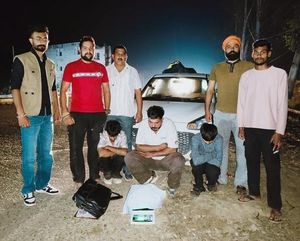Artificial intelligence (AI) is making waves across various sectors, and education is no exception. Recently, Georgia State University announced its groundbreaking partnership with Operation HOPE, aimed at launching the AI Literacy Pipeline to Prosperity Project. This initiative focuses on empowering students from underserved communities, predominantly located on the south side of Atlanta, to gain valuable skills and knowledge about AI technologies.
At the heart of this project is the nonprofit's AI Ethics Council, which consists of influential civil rights leaders, presidents of Historically Black Colleges and Universities (HBCUs), and key figures from the technology sector. The prestigious council is co-chaired by John Hope Bryant, founder of Operation HOPE, and Sam Altman, the CEO of OpenAI, the company known for developing ChatGPT. This collaboration is particularly significant, as it combines business acumen with civil rights advocacy to create educational opportunities for marginalized communities.
AI's rapid evolution has widened the gap between those who can understand and utilize it and those who cannot. The AI Literacy Pipeline to Prosperity Project seeks to bridge this gap by equipping students with the necessary tools to navigate the ever-changing technological environment. By focusing on students from areas often overlooked by traditional educational initiatives, this project aims to provide equitable access to AI education.
Speaking about the partnership, Bryant highlighted the importance of addressing educational inequities. He stated, "We must democratize access to AI education to cultivate the next generation of innovators. This project is more than just teaching technology; it's about empowering young people to become leaders in their communities. By providing these skills, we're not just preparing them for jobs—we're giving them the keys to reshape their futures."
Altman's involvement emphasizes the weight of this initiative. "It's imperative to include diverse voices and perspectives when discussing AI's impact on society," he noted. With AI technologies increasingly shaping the world, the conversation must include those historically left out of the narrative. This partnership ensures not only access to learning opportunities but also engagement with the ethical norms guiding AI's development.
The AI Literacy Pipeline to Prosperity Project will implement various educational programs, including workshops, mentorship opportunities, and access to resources on AI and technology. Participants will learn about the ethical dimensions of AI, programming, machine learning, and the practical applications of these technologies across various industries. This hands-on approach is anticipated to inspire creativity and innovation among students as they explore real-world challenges.
Such initiatives align with the broader trend of integrating AI knowledge within higher education curricula. Universities worldwide are increasingly recognizing the importance of AI literacy, both for their students and the workforce. By rolling out programs similar to Georgia State's, institutions can play pivotal roles in molding informed citizens who understand the potential and challenges of AI.
This initiative also seeks to overcome the digital divide, which disproportionately affects communities of color. By equipping students from underserved areas with AI knowledge and skills, Georgia State University and Operation HOPE aim to cultivate future leaders who will contribute positively to their communities and society at large.
It's worth noting the significant societal impact generative AI technologies already have. From enhancing education to affecting job markets, AI's reach is vast. More so, it prompts discussions about accountability and the quality of information being disseminated. Acknowledging these challenges and addressing them through educational frameworks showcases the proactive approach Georgia State and Operation HOPE are adopting.
While the partnership is considered groundbreaking, it also raises questions about the sustainability of such initiatives. To create long-lasting impact, continuous engagement with local communities and local stakeholders will be necessary. This approach should include feedback from participants and partners to refine programs as advancements and needs evolve.
Adopting AI education initiatives, such as Georgia State's AI Literacy Pipeline to Prosperity Project, marks only the beginning of much-needed systemic change. Long-term investment in AI literacy not only prepares students for future job markets but also empowers them to contribute to the discourse on technology responsibly.
With technology continuing to evolve, the need for inclusive AI education cannot be overstated. The collaborative effort between Georgia State University and Operation HOPE embodies a significant step toward ensuring all students have the opportunity to thrive and shape their futures amid technological advancements.
This project stands as a beacon of hope for those who often find themselves on the periphery of educational opportunities. Through hands-on training, mentorship, and resources, students are set to gain insights and skills instrumental for their ambitions—not just for personal gain but for societal growth.
The AI Literacy Pipeline to Prosperity Project cannot only illuminate paths to the future; it promises to give voice to those historically underrepresented within the tech sphere. The partnership exemplifies how educational institutions, nonprofits, and tech leaders can unite to combat systemic barriers, ensuring progress is shared, inclusive, and representative.



